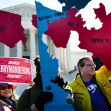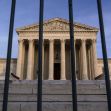On Tuesday, the U.S. Supreme Court repudiated a legal theory that threatened to radically reshape the way elections are conducted in the country. If allowed to proceed unchecked, the controversial legal doctrine would have granted state lawmakers carte blanche to control state and federal elections without judicial review.
The so-called “independent state legislature theory” (ISLT) broadly asserts that state courts have little to no authority to question decisions made by state lawmakers. The theory relies on an extremely narrow reading of two clauses in the Constitution that delegate power to administer federal elections to the states, subject to Congressional oversight.
The Elections Clause in the U.S. Constitution, Article 1, Section 4, reads: “The Times, Places and Manner of holding Elections for Senators and Representatives, shall be prescribed in each State by the Legislature thereof; but the Congress may at any time by Law make or alter such Regulations.” The Presidential Electors Clause, Article 2 Section 1, states: “Each State shall appoint, in such Manner as the Legislature thereof may direct, a Number of Electors…”
According to the ISLT, the framers used the term “legislature” exclusively, meaning without the possibility of any other checks and balances. The most extreme version of the theory would essentially invalidate state constitutional provisions that protect the right to vote or limit gerrymandering. State governors would have no power to veto laws concerning federal elections, and state courts would have no power to review or invalidate such laws.
The once-fringe theory has grown in popularity in recent years, used by conservative lawmakers in attempts to justify partisan and racial gerrymandering, as well as in attempts to overturn federal elections despite the will of the voters.
In Moore v. Harper, decided on June 27, a 6-3 majority of the Supreme Court put the ISLT to bed. Chief Justice John Roberts wrote the majority opinion, joined by the three liberal justices Sonia Sotomayor, Elena Kagan and Ketanji Brown Jackson, as well as two of the conservative members of the Court, Brett Kavanaugh and Amy Coney Barrett. Justices Thomas, Gorsuch, and Alito dissented. The Court ruled that state legislative decisions concerning elections are constrained by federal and state constitutions, as well as ordinary state laws, and are subject to judicial review.
The majority opinion emphasized that judicial review has been a key part of the constitutional system since the nation’s founding. “When state legislatures prescribe the rules concerning federal elections, they remain subject to the ordinary exercise of state judicial review.”
The majority ruling does not give state courts unfettered authority to usurp the role of state legislatures. “The questions presented in this area are complex and context specific,” the opinion stated. Federal courts may still need to step in and check state courts that “transgress the ordinary bounds of judicial review such that they arrogate to themselves the power vested in state legislatures to regulate federal elections.” The Court declined, however, to affix a specific test for determining when a state court has so exceeded its authority.
Some legal commentators believe this caveat leaves the door open for future challenges, such as if a state supreme court were to settle a federal election in a manner the U.S. Supreme Court majority does not like. For now, however, along with the Court’s recent ruling upholding a ban on racial gerrymandering, the decision to reject the ISLT has calmed some fears that the conservative supermajority was poised to completely upend elections in the country.






